(完整版)上海牛津版英语九年级下册Unit5教案
九年级英语下册 Unit 5 A story by Mark Twain教案 (新版)牛津上海版-牛
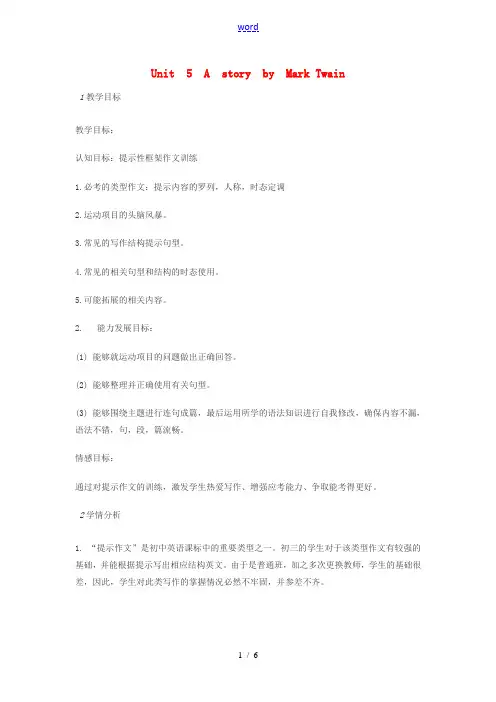
Unit 5 A story by Mark Twain1教学目标教学目标:认知目标:提示性框架作文训练1.必考的类型作文:提示内容的罗列,人称,时态定调2.运动项目的头脑风暴。
3.常见的写作结构提示句型。
4.常见的相关句型和结构的时态使用。
5.可能拓展的相关内容。
2. 能力发展目标:(1) 能够就运动项目的问题做出正确回答。
(2) 能够整理并正确使用有关句型。
(3) 能够围绕主题进行连句成篇,最后运用所学的语法知识进行自我修改,确保内容不漏,语法不错,句,段,篇流畅。
情感目标:通过对提示作文的训练,激发学生热爱写作、增强应考能力、争取能考得更好。
2学情分析1. “提示作文”是初中英语课标中的重要类型之一。
初三的学生对于该类型作文有较强的基础,并能根据提示写出相应结构英文。
由于是普通班,加之多次更换教师,学生的基础很差,因此,学生对此类写作的掌握情况必然不牢固,并参差不齐。
2. “提示作文”是“会考”的必考点之一,分值15分,所占比分很大,容易唤起学生对写作的学习兴趣,他们也很想写好这一类作文,有利于他们备考作文打下坚实基础,有利于为图示类作文作进一步的思考和探讨。
3.学生分析 : 初三(5)于初三接手,学生对英语学习有一定的积极性,但基础差,在年级排较后,上学期全区统考平均分接近72分(135分计),一半学生在合格以下,及格率48%,39分以下学生有一部分。
只有选择由易到难,步步为营的写作方法,才能给学生课堂上的成就感,以此为契机,提高学生的学习积极性和考试成绩。
由于学生起步较低,参差不齐,着眼于基本内容提示的罗列教学,同时对优秀生进行语法与流畅的点拨和自我作文修改的指导。
教学重点:1. 提示性框架作文:帮助学生将提示内容的罗列,确定人称,时态2.进行运动项目的头脑风暴,通过问答,整理出本课常见的相关句型和结构。
3.能够围绕主题进行连句成篇,最后运用所学的语法知识进行自我修改,确保内容不漏,语法不错,句,段,篇流畅。
沪教牛津版牛津深圳版九年级英语下Unit 5 Sport Environmental problems 教案
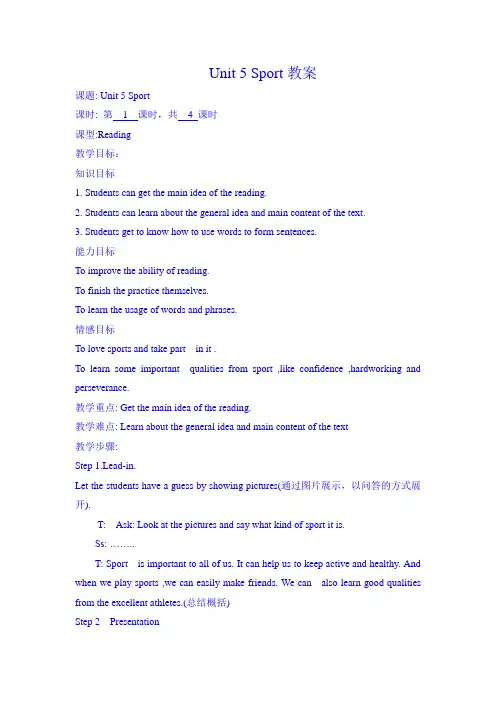
Unit 5 Sport教案课题: Unit 5 Sport课时: 第 1 课时,共 4 课时课型:Reading教学目标:知识目标1. Students can get the main idea of the reading.2. Students can learn about the general idea and main content of the text.3. Students get to know how to use words to form sentences.能力目标To improve the ability of reading.To finish the practice themselves.To learn the usage of words and phrases.情感目标To love sports and take part in it .To learn some important qualities from sport ,like confidence ,hardworking and perseverance.教学重点: Get the main idea of the reading.教学难点: Learn about the general idea and main content of the text教学步骤:Step 1.Lead-in.Let the students have a guess by showing pictures(通过图片展示,以问答的方式展开).T: Ask: Look at the pictures and say what kind of sport it is.Ss: ……..T: Sport is important to all of us. It can help us to keep active and healthy. And when we play sports ,we can easily make friends. We can also learn good qualities from the excellent athletes.(总结概括)Step 2 PresentationReadingPart A( A1,A2).A1:Write the correct name of the sport under each picture.(采用ask &answer形式)A2 Which sport(s) do you like or dislike? In pairs, discuss this with your classmate.(分组进行,每组总结发言)Part B.Look at the photos, the title and the first paragraph of the article on page 67. Then answer the questions.T:Read to get the main idea by skimming ,scanning and task-reading. (展示课件,提醒学生速读,注意针对问题把握重点)Listen to the passage and answer the questionsT: Listen to the reading .(展示问题,利用Reading练习听力,一举两得)Task-readingT: read carefully and try to finish the practice as soon as possible.(针对Task1,Task2,Task3,边展示课件,边讲解)Part CV ocabularyC1 T:Le t’s re vise vocabulary and try to guess which word or phrase in the reading has the same meaning as the phrases in brackets .(展示课件并通过具体的实例讲解做题的技巧,边提示边练习)C2: T:Words and phrases practice. (展示课件,问答)Part DComprehensionT: D1 and D2 are mainly about how much you have learned the readi ng. Let’s have a check.(利用课件进行问答)D3 DiscussionIn groups, discuss the questions. (调动学生参与积极性)Step3.Practice in classGroup WorkDiscuss the question below in groups and then report your result to the whole class.Let’s see which group is the best! (让学生问题为话题,展开讨论。
沪教牛津深圳版初中英语九年级下册unit5 教案3
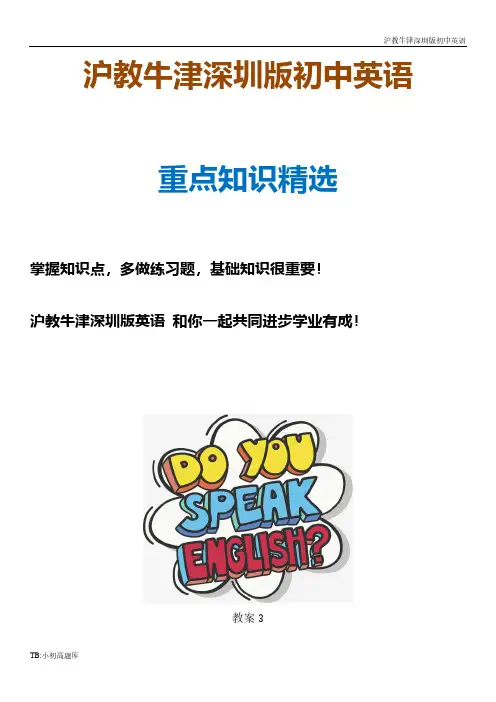
language points.
learning sheet ability of self-
自学
①Read the text to
about the
study on the key
课文
understand the important language points. points.
中的
words and phrases.
2. Help ss know
Vanessa’s first
day
to
understand the
text better by
reading it para
by para.
TB:小初高题库
4. Read para 3 and answer the questions.
Put the sentences into a correct order.
solve the different points. organize the
④Show the learning result class to work in 3. Cooperation
by groups.
groups (leader ability is trained
and members). here.
沪教牛津深圳版初中英语
5. Read the last paragraph,
and then judge T or F.
第二 Step 2 Language points 6. Self-study on the
3. Present the 2. Cultivate ss’
环节 (self-study).
第三 Step 3 环节 Using the 课堂 points.
沪教牛津版初中英语九年级下册教案教学设计u5-3

Teaching procedures
Steps
Teacher's
activity
Students' activity
Purpose
Step 1
Lead-in
Ask students to get prepared for the class and review the topic from the speaking session.
Introduce the four-step writing strategy. 1. Identify the topic.
1Let students read the notice again and get a clear idea of what to write.
2Lead students to brainstorm on what sports can be done at home.
Step 3 Whilewriting
Ask students to start a draft under the instruction illustrated before.
Write a draft by using the four-step writing strategy.
To guide students to practise on their own with the help of the strategy.
To grasp proper expressions and diverse sentence patterns about favourite sports.
最新牛津上海版英语九年级下册《chapter 5 family lives》教案.doc
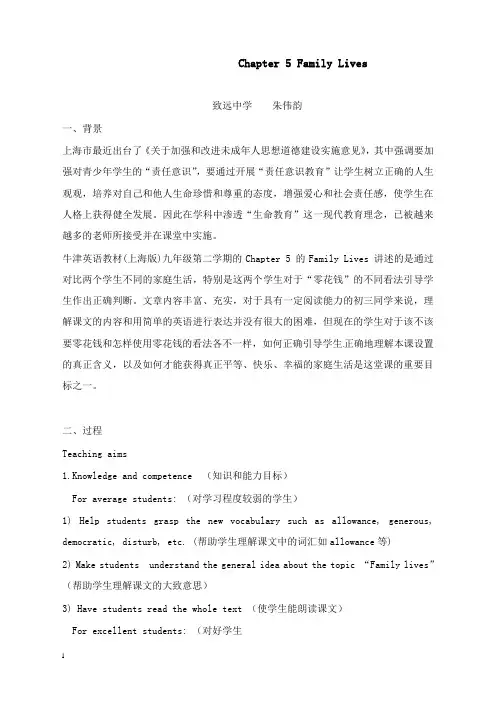
Chapter 5 Family Lives致远中学朱伟韵一、背景上海市最近出台了《关于加强和改进未成年人思想道德建设实施意见》,其中强调要加强对青少年学生的“责任意识”,要通过开展“责任意识教育”让学生树立正确的人生观观,培养对自己和他人生命珍惜和尊重的态度,增强爱心和社会责任感,使学生在人格上获得健全发展。
因此在学科中渗透“生命教育”这一现代教育理念,已被越来越多的老师所接受并在课堂中实施。
牛津英语教材(上海版)九年级第二学期的Chapter 5 的Family Lives 讲述的是通过对比两个学生不同的家庭生活,特别是这两个学生对于“零花钱”的不同看法引导学生作出正确判断。
文章内容丰富、充实,对于具有一定阅读能力的初三同学来说,理解课文的内容和用简单的英语进行表达并没有很大的困难,但现在的学生对于该不该要零花钱和怎样使用零花钱的看法各不一样,如何正确引导学生正确地理解本课设置的真正含义,以及如何才能获得真正平等、快乐、幸福的家庭生活是这堂课的重要目标之一。
二、过程Teaching aims1.Knowledge and competence (知识和能力目标)For average students: (对学习程度较弱的学生)1) Help students grasp the new vocabulary such as allowance, generous, democratic, disturb, etc. (帮助学生理解课文中的词汇如allowance等)2) Make students understand the general idea about the topic “Family lives”(帮助学生理解课文的大致意思)3) Have students read the whole text (使学生能朗读课文)For excellent students: (对好学生1) Have students to develop the listening and reading skills (understanding and processing the information in the reading materials) (培养学生的听力和阅读及在阅读中获取信息的能力)2) Make students learn more about family lives ,and encourage them to say something more about their own family lives(使学生了解更多有关家庭生活方面的内容并鼓励学生用所学的词汇说出他们自己的家庭生活情况)3) Have students to think more deeply about what they have read (使学生对所学内容有进一步的理解)2.Process and approaches (过程和方法)1)Train the students’listening ability and help them catch some key words to guess the meaning of the sentences and understand the general idea of the passages (能在听中克服生词障碍,理解大意,获取准确信息)2) Train the students speaking ability by answering the questions on the text and discussing some topics. Make students able to express their own ideas in simple English (通过回答问题和小组讨论培养学生开口说话的能力, 并能用简单的语言表达自己的思想和观点)3) Train students’reading ability of the text and also help them to read some relevant materials for specific information (能正确流畅地朗读课文,能在阅读中运用阅读策略获取所需的信息.)4) Train students’writing ability by gathering and sharing information, ideas in each paragraph. To help them write composition about the topic (能从文章中获取主要信息,并能写出有关这一主题的文章)3. Emotion , attitude and value evaluation (情感、态度和价值观)1) To arouse the students’interest in learning English(激发学生学习英语的兴趣)2) To make the students take part in English communicative activities willingly (积极参与课堂活动)3) To help the students learn to cooperate with their classmates and accomplish their tasks together (培养学生的合作和团队精神)4) To encourage the students to solve the problems by dealing with the related information found by themselves. (鼓励学生自己提出问题和解决问题的能力Language focus: (教学重点)Make the students know the main four aspects of one’s family lives and make them be able to talk freely about them.Language difficulties: (教学难点)Require the students to say some other aspects of one’s family lives and to make dialoguesabout the topic.Teagprocedures:(教学过程)Read thethe studentshow the Ss aShow the Ss a教学反思:在课堂教学中教师必须把学生作为一个鲜活的生命个体来看待,促进学生的发展,宽容个体差异,应使学生始终处于被激励的气氛中,让他们在课堂中焕发出生命的活力。
牛津上海版九年级下册 Unit 5 A story by MarkTwain教学设计
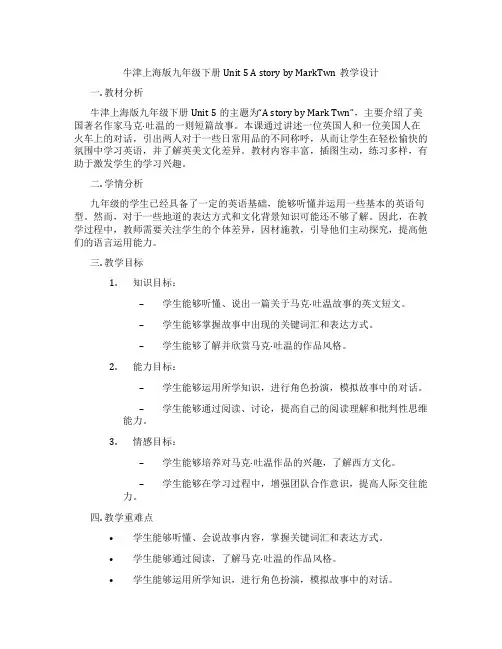
牛津上海版九年级下册 Unit 5 A story by MarkTwn教学设计一. 教材分析牛津上海版九年级下册Unit 5的主题为“A story by Mark Twn”,主要介绍了美国著名作家马克·吐温的一则短篇故事。
本课通过讲述一位英国人和一位美国人在火车上的对话,引出两人对于一些日常用品的不同称呼,从而让学生在轻松愉快的氛围中学习英语,并了解英美文化差异。
教材内容丰富,插图生动,练习多样,有助于激发学生的学习兴趣。
二. 学情分析九年级的学生已经具备了一定的英语基础,能够听懂并运用一些基本的英语句型。
然而,对于一些地道的表达方式和文化背景知识可能还不够了解。
因此,在教学过程中,教师需要关注学生的个体差异,因材施教,引导他们主动探究,提高他们的语言运用能力。
三. 教学目标1.知识目标:–学生能够听懂、说出一篇关于马克·吐温故事的英文短文。
–学生能够掌握故事中出现的关键词汇和表达方式。
–学生能够了解并欣赏马克·吐温的作品风格。
2.能力目标:–学生能够运用所学知识,进行角色扮演,模拟故事中的对话。
–学生能够通过阅读、讨论,提高自己的阅读理解和批判性思维能力。
3.情感目标:–学生能够培养对马克·吐温作品的兴趣,了解西方文化。
–学生能够在学习过程中,增强团队合作意识,提高人际交往能力。
四. 教学重难点•学生能够听懂、会说故事内容,掌握关键词汇和表达方式。
•学生能够通过阅读,了解马克·吐温的作品风格。
•学生能够运用所学知识,进行角色扮演,模拟故事中的对话。
•学生能够通过阅读、讨论,提高自己的阅读理解和批判性思维能力。
五. 教学方法1.情境教学法:通过设置情境,让学生在真实的语言环境中学习英语,提高他们的语言运用能力。
2.交际法:通过角色扮演、小组讨论等活动,让学生在交流中学习,提高他们的口语表达能力和团队协作能力。
3.任务型教学法:通过完成各种任务,让学生在实践中学习,提高他们的综合语言运用能力。
英语:Unit5《Points of view》-grammar教案(牛津上海版S1B)
Chapter5. Points of view-grammar一、章节分析(一)综述本章节主要语法---真实条件状语从句和非真实条件状语从句。
真实条件状语从句表示现实情况中可能实现的情况,而非真实条件状语从句表示与现在和过去情况相反的假想情况。
(二)目标学习真实条件状语从句,非真实条件状语从句句型变化以及它们不同的含义等。
(三)教学方法口语情景教学法( 教师创设情景,学生主要通过口语训练达到对语言知识的掌握)(四)重点和难点1简单总结一些真实条件状语从句表示现实情况中可能实现的情况,2细讲非真实条件状语从句中表示与现在和过去情况相反的假想情况的句型变化以及它们不同的含义二、教学设计(Teaching Designs)1Ask students to read the following three sentences carefully and tell the differences:a)If you boil water, it becomes steam.b)If a child buys these toys, he or she will learn nothing.c)The TV Authority would ban an ad if it made children feel inferior.2Explain the meanings and structures of the conditional sentences mentioned above: Sentence1: Saying something that you believe is definitely true.Simple present tense in if clause and in main clauseSentence2: Saying something that you believe is possibly true or probably happen.Simple present tense in if clause, simple future tense in main clause.Sentense3: Saying something that is imaginary or not probableSimple past tense in if clause, conditional tense in main clauseNote that if clauses can come before or after main clauses. We put a comma after if clauses that come before main clauses.Step Two Presentation1Saying something that you believe is definitely true.1). Ask students to combine the clauses in columns A and B to make sensible sentences.A B1. If you advertise products a. people complain2. If products are of high quality b. if prices rise3. Sales of products rise c. you sell more of them4. If you do not advertise products d. if prices fall5. If the quality of products is not good e. people do not complain6. Sales of products fall f. you sell fewer of them(Key: 1.c 2.e 3.d 4. f 5. a 6.b)2. Saying something that you believe is possibly true or probably happen.1)The students are required to work in pairs. One student asks a question whilethe other student chooses suitable answers to S1’s questions from the box on the right.For example:S1: Does he know what to do if a customer faints?S2: If a customer faints, he will call a nurse.1. ____________ (break) something? Ask for cash2.____________(be) rude? Call a teacher3.____________(ask) for discount? Ask him or her to pay forit4. ___________(try) to steal something? Ignore him or her5. ___________(have) a complaint? Call a security guard6.____________(want) to pay by credit card? Refuse to give itKey: 1).S 1: Does he know what to do if a customer breaks something?S2:If a customer breaks something, he will ask him or her to pay for it.2)S1:Does he know what to do if a customer is rude?S2:If a customer is rude ,he will ignore him or her.3)S1: Does he know what to do if a customer asks for a discount?S2: If a customer asks for a discount , he will refuse to give it.4)S1: Does he know what to do if a customer tries to steal something?S2: If a customer tries to steal something, he will call a security guard.5)S1: Does he know what to do if a customer has a complaint?S2: If a customer has a complaint, he will call a teacher.6)S1: Does he know what to do if a customer wants to pay by credit card?S2:If a customer wants to pay by credit card, he will ask for cash.2. Picture talkPasty Liang has a little brother who is sometimes naughty. She has to warn him about things. Look at the words and pictures and complete pasty’s warnings. Put the verbs in the correct tenses . The first one is done for you.(见课件:things that will probably happen.ppt)3. General introduction of three basic structures in subjunctive mood(见课件:summary.ppt)4. a) Saying something that is imaginary or not probable1). Introduction of structure2). Work in pairs to make a short dialogue. Student 1 says the fact in the picture while student 2 makes a response using simple past tense in if clause and would/should/could/might +verb in main clause. Follow the example: S1:He doesn’t ha ve a ticket.S2:If he had a ticket, he’d go into the cinema.(见课件:things that will not happen.ppt)b)Saying things that didn’t happen in the past1). Introduction of structure2).Read the situations and then write if sentences. Use the past perfect tense in ifclause and would have +past participle in the main clause. Use commas where necessary and make any necessary changes (e.g move nouns to the clause thatcomes first and pronouns to the clause that comes last)Eg: Tony had a stoach-ache because he had a very hot chicken curry for dinner.If Tony hadn’t a very hot chicken curry for dinner, he wouldn’t have hada stomach-ache.1). There was a typhoon so we didn’t go to school.___________________________________if__________________________________2).We missed the bus because we didn’t run for it__________________________________________________if___________________________3).Richard didn’t phone Owen because he didn’t know his phone number.If___________________________________________________________________________4).Pauline took her new video player back to the shop because it didn’t workproperlyIf__________________________________________________________________________ __5).Joyce misunderstood the teacher and so she did five exercises for homeworkinstead of one._______________________________________________if__________________________ __Key:1.We would have gone to school if there had not been a typhoon.2.We would have caught the bus if we had run for it.3.If Ric hard had known Owen’s phone number, he would have phoned her.4.If Pauline’s new video player had worked properly, he wouldn’t have takenit back to the shop.5.Joyce wouldn’t have done five exercises for homework instead of one ifshe had understood the teacher.3. Quick response:Evis Hu went shopping yesterday. Here are some of the things that didn’t happen while he was in the mall. Ask two students to make two sentences about each picture. Student 1 tells fact according to the pictures while student 2 makes a quick response using past perfect tense in if clause and would/should/could/might +have done in mainclause. The first one is done for youS1: Evis didn’t see his friend.S2: If he had seen her , he would have spoken to her.(见课件:things that did not happen in the past.ppt)拓展部分c).saying things that will not happen in the futureRead the situations and then write if sentences. Use the past tense /should do/were to do in if clause and would/should/could/might +verb in the main clause. Use commas where necessary and make any necessary changes1)be fine, tomorrow, go on with our harvest2)have enough time, discuss the matter3)there be a letter, keep, in the drawerKey:a)If it should be fine tomorrow, we would go on with our harvestb)If we were to have enough time, we could discuss the matter3) If there should be a letter for me, please keep it in the drawer.Step three : AssignmentI. Fill in the blank using the proper verb form1.If you ____(be) in my place, you would do the same thing.2.If there were more room, they ____(can put) the piano in.3.If I had learned English well, I ____(be) able to talk with native speakers.4.If she _____(come) tomorrow, I would tell her the news.5.If there _____(be) enough parking-lots, the drivers wouldn’t have had any troubleparking their cars.6.If the lecturer should be late, you ____(have) to make a speech first.7.If the earth stopped turning suddenly, what ____(happen) then?8.If there hadn’t been much rain in spring, we ______(have) a good harvest ofwatermelons now.Key:1. were 2. could put 3. would have been 4. should come 5. had been6. would have7. would happen8. would have hadII.Translation:a)如果我现在身边有钱.我就借点给你.b)如果现在我有时间,我会和你一起购物.c)如果昨天我在这儿,我就知道一切了.d)假如我当初早一点出发,我就能赶上头班车了.e)如果今年冬季下雪,明年的庄稼会更好.f)如果我们明天有足够时间,我们可以讨论那个问题了.Key:1.If I had money on me, I would lend you some.2.If I had time now, I would go shopping with you.3.If I had been here yesterday, I would have kown all.4.If I had started earlier,I would have caught the first bus.5.It it should /were to/ snowed this winter, the crops would grow better.6.If we were to have enough time tomorrow, we could discuss the matter.。
沪教版(牛津)九年级英语下册Unit 5 Sport - Period 2 公开课PPT课件
Read the third paragraph and answer the questions below.
Keep one’s balance
Read the third paragraph and answer the questions below.
Read the third paragraph. Complete the sentenceБайду номын сангаас and then put them in the right order.
Homework
1. 抄写单词和短语:passport,the Pacific, opposite,glove,couple,gentle,honest,rope, rapid,over,shame;(be) dying to (do sth.), can’t wait to (do sth.),to be honest,fall over, keep one’s balance。
Replace the italicized words with information from the text.
me We
it This
us
It
D3 In groups, discuss the following questions.
Pair work
Why does Vanessa think this is an “unforgettable” experience? Brainstorm reasons with your classmates.
Read the fifth paragraph and decide whether the following statements are T (True) or F (False).
U5TomSawyerpaintsthefence教案2021-2022学年牛津上海版九年级英语下册
Unit Five Tom Sawyer paints the fence教材分析以及学情分析:本篇课文取自于马克吐温的著名小说《汤姆索亚历险记》,主课文部分节选了其中一段汤姆索亚利用了自己的智慧完成了非常苛刻的任务,读来充满了故事性,童趣和智慧,非常容易理解。
而作为初中科文中为数不多的名著简译本的节选,通过学习课文不但使学生掌握了文章中的语言知识点,也唤起了他们对名著阅读的兴趣。
听力部分配合课文简要介绍了马克吐温的生平,使学生在原来的基础上进一步提高了文学修养,也学会了在听力练习的过程中如何更好地抓住重要的信息。
而之后的Speaking, Language, More Practice等部分无不围绕名著阅读者以主题展开,有富有情趣的片断以及引出的相关讨论,令学生在学习英语的同时能领略到经典名著的博大精深,同时结合自己的情况有所感悟,真正体现新课标和两纲精神的结合。
Period 1Teaching Aim:知识与技能:1. Enable students to have a basic understanding of the plot of the mainpassage and some target vocabulary with the aid of the vocabulary list*target vocabulary: encourage, dip section, make fun of, go on, properly,marbles, and so on, gain, depress, beg, ignore, joy, guess2.Develop students’ skill of oral expression情感态度价值观:3.Arouse students’ expectation of the main passage and their interest in classic novel4.Encourage students to imagine and have a better understanding of the history 过程与方法:1. Brain storm2.Pre-reading taskPresentation:A. Pre-chapter activities1.Tell students that they are going to read a funny story about a boy in America in 1830,meanwhile, ask them if they had read any story-book in English, encourage students to develop the habit of reading for pleasure and reading regularly.2.What do you know about…Look at the pictures in page 46. Which of these things did people have in America at that time. (Introduce the historic background of the story)B. Reading1.Find the factsLook at the title and read through the story on the next page, then answer the questions 2.Read the new words and expressions of the Main Passage in the vocabulary listC. Consolidation exercises about vocabularyEX C1: Ask students to complete EX C1 without using their dictionaries. They must locate the words of phases in their contexts in the passage, answer, for thatparticular context.Ex C2: Makes students to use the words form the passage and put them into a new context, dictionaries allowed.Homework:1. WB Ex.A1 A22. Review the main passagePeriod 2 ReadingTeaching Aim:知识与技能:1.Synopsis of the textnguage points in the text:Expect/ depress/think phrase/ go on doing/ignore/ more and moreBy …. (pay attention to the tense)3. Develop students’ listening skill and ability to take notes from a lecture.情感态度价值观1.Arouse students’ interest in the text and English2.Arouse students love for classic story-book过程与方法:1.From general idea to details2.Question and AnswerPresentation:Pre-teachingA.Lead- inThis is a simplified version of an incident described in Mark Twain’s book The Adventures of Tom Sawyer.1. Read the vocabulary2. Check homework WB Ex.A1 A23.Synopsis of the text (T.47)While-teachingExercise D Read and ThinkA.1. The questions in Exercise D! make students think a bit more deeply about some aspectsof the passage.2. Exercises D2 focus on reference items. Students should often asked to say what words like it, this, he and she refer to, to make sure that fully understand the passage.B. Listening ---- Taking notes from a lectureThe Listening task gives students a brief biography of the famous American writer, Mark TwainHomework:1.Review Reading2.Preview LanguagePeriod 3 LanguageTeaching Aim:知识与技能1. Adjective clauses with who, that and which2. Adjective clauses and adjective phrases3. Using the generic plural with adjective clauses情感态度价值观1.Develop students ability to describe and modify sth.2.Encourage students to cooperate each other过程与方法1. Monologue2. Dialogue3. Written practicePresentation:A.Adjective clauses with who, that and which(板书设计)2.Write some sentences on the board.(T.51)3.Show the class how the two sentences can be joined, using who or that for people andwhich or that for things(配合练习:Exercise B,C,D,E)B.Adjective clauses and adjective phrasesAdjective clauses have a relative pronoun and a verb , buy adjective phrase do not.When an adjective clause contain the verb be, we can often replace the clause with an adjective phrase.e.g. She is the next person who is in the bus queue.= She is the next person in the b us queue.Notes:In the adjective clauses above, we can delete the relative pronouns and the verb be to make adjective phrases. However, we cannot use an adjective phrase when the verb be is followed by an adjective or adjectives only; instead, we put the adjective before the noun it describes.(配合练习:GB EX.B)ing the generic plural with adjective clausesWhen we talk about tings in general, we often use the plural form of a countable noun + be + noun + adjectives.e.g. Taxi- drivers are people who often work late.(配合练习:GB EX.C)Homework:1.WB related exercises2. Find out the experience of Mark TwainPeriod 4 More PracticeTeaching aims知识与技能:1.Develop students’ extensive reading skillnguage points in More Practice情感态度价值观:1. Arouse students’ interest in world-famous writers and story books2. Encourage students to set up a right attitude towards life过程与方法:1. Monologue2. skimming exercise3. multi-media equipmentPresentation:A.Skim the text and answer the questions based on information in the passageD. Activity:1. Tell the class more about Mark Twain.2. Write down some of the other works written by Mark Twain in the space in the textbook.Homework课外练习相关配套练习。
牛津上海版九年级下册 Unit 5 A story by MarkTwain教学设计1
牛津上海版九年级下册 Unit 5 A story by MarkTwn教学设计1一. 教材分析牛津上海版九年级下册Unit 5的主题是“A story by Mark Twn”,通过学习这篇课文,学生可以了解马克·吐温的作品以及其独特的写作风格。
本节课的主要内容是让学生能够理解并运用课文中的重点词汇和句型,提高阅读理解能力,同时培养学生的批判性思维和文学鉴赏能力。
二. 学情分析九年级的学生已经具备了一定的英语基础,能够听、说、读、写简单的英语句子。
然而,对于马克·吐温的作品以及美国历史和文化可能了解不多,因此需要教师在教学中进行适当的引导和补充。
学生的学习动机和学习兴趣各不相同,因此教师需要设计有趣且具有挑战性的教学活动来激发学生的学习热情。
三. 教学目标1.能够理解并运用课文中的重点词汇和句型。
2.提高阅读理解能力,理解课文的主旨和细节。
3.培养学生的批判性思维和文学鉴赏能力。
4.能够运用英语进行简单的交流和讨论。
四. 教学重难点1.重点:课文中的重点词汇和句型的理解和运用。
2.难点:对课文主旨和细节的理解,以及批判性思维和文学鉴赏能力的培养。
五. 教学方法1.任务型教学法:通过设计各种任务,让学生在实践中学习和运用语言。
2.合作学习法:鼓励学生进行小组合作,共同完成任务,培养学生的团队合作能力。
3.引导式教学法:教师引导学生进行思考和讨论,培养学生的批判性思维。
六. 教学准备1.课文文本和相关的多媒体教学资源。
2.教学PPT或者黑板。
3.学生活动材料。
七. 教学过程1.导入(5分钟)教师通过提问方式引导学生思考他们对于马克·吐温的了解,激发学生的学习兴趣。
教师可以提出一些问题,如:“Who knows something about Mark Twn?”, “Have you ever read any of his works?”等。
2.呈现(10分钟)教师通过PPT或者黑板,呈现本节课的重点词汇和句型,同时给出例句进行解释和展示。
- 1、下载文档前请自行甄别文档内容的完整性,平台不提供额外的编辑、内容补充、找答案等附加服务。
- 2、"仅部分预览"的文档,不可在线预览部分如存在完整性等问题,可反馈申请退款(可完整预览的文档不适用该条件!)。
- 3、如文档侵犯您的权益,请联系客服反馈,我们会尽快为您处理(人工客服工作时间:9:00-18:30)。
九下Unit 5Important words and phrases短语单词1.渴望(做某事); 极想(做某事) 1. 公告n2. 登记; 报到 2.护照3. 说实在的 3.太平洋4. 被……绊倒 4.加拿大n adj5. 保持平衡 5.与。
相对,在。
对面6. 建立 6.手套7. 持续7.温柔的,平缓的8. 与……不同8.坦诚的,坦率的9. 古时候9.绳索n10. 不允许做某事10.迅速的,快速的11. 远离11.令人惋惜的事12. 乘地铁12.决赛13.精神压力,紧张知识点:1.Opposite _______________1)我家在学校对面, 因此我每天走路去上学。
________________________________________________________2)我们坐在桌子的两端。
We sat at ___________ ends of the table.【总结】opposite用作介词, 意为“与……相对; 在……对面”, 如例1; 用作形容词, 意为“另一边的; 相反的; 对面的”, 如例2。
【运用】请写出下列句子中opposite的词性。
1). Jackson sat opposite me at breakfast.词性: _______2). We live on opposite sides of this city.词性: _______2.announcement n ________________ v _______________1. 下个月将有一个通告发布。
_________________________ will be made next month.2.J杰克声称他已戒烟。
Jack ___________ ___________ he had given up smoking.【总结】announcement用作名词, 意为“公告; 通告”, 常用搭配为make an announcement,意为“发表公告”, 如例1; announce为其动词形式, 意为“声称; 宣布”,【运用】根据汉语意思, 完成句子, 每空一词。
1) 我们公司将会在本周五发布新产品的公告。
Our company is going to _____ ______ ______ about our new product this Friday.2) 珍妮宣布她将于下个月结婚。
Jenny ______ ______ she will get married next month.3.shame n ____________ v_________【展示】1. It’s __________ _________ that you can’t go camping with us this weekend.这周末你不能跟我们一起去野营真是遗憾。
2.他所做的事使他的母亲蒙羞。
What he _________ ________ _________ his mother.【总结】shame用作名词, 意为“令人惋惜的事; 让人遗憾的事”, 如例1; 用作动词, 意为“使羞愧; 使丢脸”【运用】根据汉语提示完成句子, 每空一词, 缩写算一词。
1) 真遗憾你不能来参加歌唱比赛。
______ _____ _____ _____ you c an’t take part in the singing competition.2) 他的行为已使整个学校蒙受耻辱。
His behavior ______ _____ the whole school.4.honest adj ___________ 反义词_______________ 老实说__________________1) 她是一个勤劳正直的女人_______________________________________2) 他是个奸商_________________________________ trader 商人3) 说实话,我不太喜欢这种事物__________________________________________4) 坦白地说,他的话真不值得相信__________________________________________5.couple n ____________ a couple of _______________1) 隔壁的那对夫妇很友好______________________________2) 有两个女孩在等你_________________________________3) 过两天你就会好的__________________________________6.instructor n 指导员,教练v ____________ n_______________1) 大卫是一位滑雪教练______________________________________2) 有植树指南吗?___________________________________________3) Make sure you carry out the director’s _________________4) The school gives _____________in First Aid7. Final n ____________ 进入决赛______________ final 最终的adj1)同学们正在准备期末考试_______________________________________2) After several delays we __________ took off at six o’clock3)他第一次打进了男子网球决赛He ____________ the men’s tennis _________ for the fist time重点句型1.take sb to a holiday ___________________去年,我父母带我度过了一个特殊的假期________________________________________ 2.be dying to do sth______________________我很想看看这究竟是什么____________________________我很想喝杯茶___________________________________3.can’t wait to do sth _____________________-我迫不及待告诉大卫这个好消息_______________________________________-假期就要到来了,同学们都迫不及待想去旅游______________________________________________________________4.Keep on doing ________________你可得继续努力___________________________________________为了达到目标,大家都不断地加班完成任务_________________________________________课堂练习I. 根据下列句子及所给单词的首字母写出所缺单词。
1. Our office is o______ a kindergarten, so we often see many lovely children there.2. It is a s______ to leave the theatre now because the film is so funny.3. Put on your coat, scarf, g______ and boots. It’s really cold outside.4. The c________ have no children, so they decide to adopt (领养) a daughter.5. As a beginner, you’d better choose a g_______ slope to skate.6. She walked at a r________ pace along the street so that she could arrive at the office early.7. It was all o________ when I arrived at the spot.8. Hold fast to the r_______ and I will pull you up.II. 同义替换。
( ) 9. Please be honest to me. I want to know the truth.A. friendly and humorousB. open and directC. kind and outgoing ( ) 10. The trip to Europe was an unforgettable experience for me.A. a memorableB. an interestingC. a comfortable( ) 11. When I arrived at the station, the train had already left.A. CameB. TouchedC. reached( ) 12. I was pleased with myself because I got good grades after hard work.A. was sorry forB. was happy withC. was afraid of( ) 13. Although she was ill, she kept on working.A. ThoughB. SinceC. While( ) 14. Have you seen the house opposite the railway station?A. at the end ofB. in the middle ofC. on the other side of ( ) 15. What a shame! You missed such a wonderful film.A. pityB. surpriseC. joy( ) 16. When we arrived, it was already midnight and the party was over.A. startedB. endedC. continued( ) 17. Our city is developing at a rapid speed.A. fastB. slowC. real( ) 18. I’m afraid I can’t afford the medical fee.A. giftB. productC. bill( ) 19. To be honest, I’d rather stay at home than go out with him.A. To be seriousB. To be fairC. To tell the truth( ) 20. I am dying to meet my old friend because we h aven’t seen each other for three years.A. can’t wait toB. don’t want toC. agree to( ) 21. Mr Smith is going to build up a new business next month.A. set outB. set upC. make upIII. 词汇释义。
